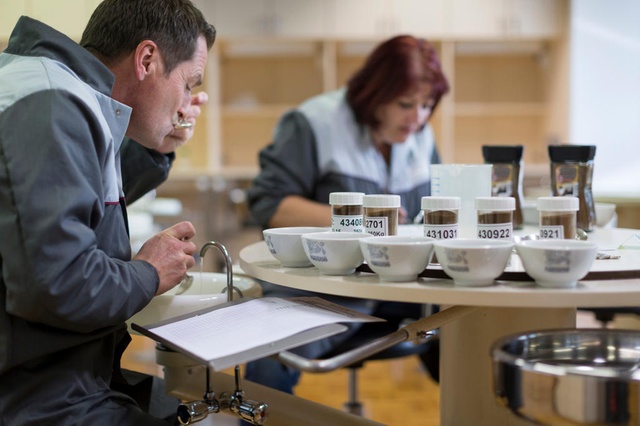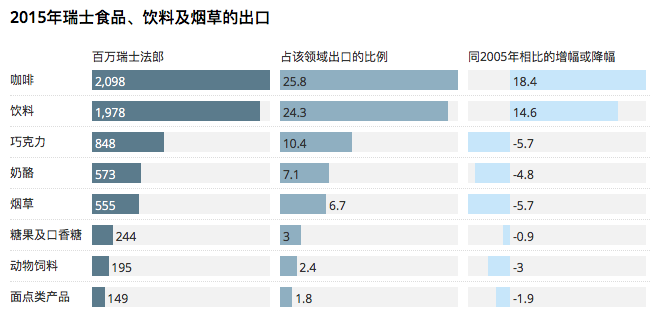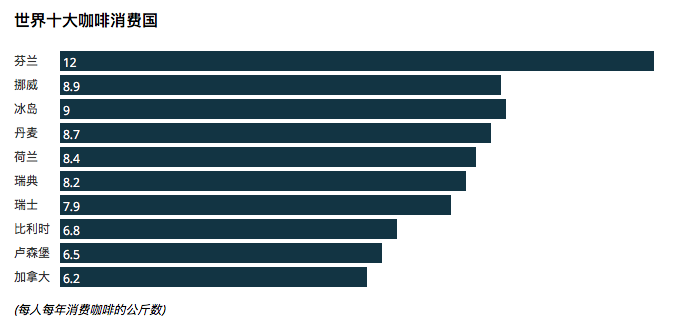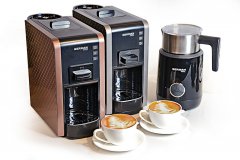When Swiss Coffee meets Chinese "double Festival"
Professional barista communication, please pay attention to coffee workshop (Weixin Official Accounts cafe_style)

At the Nestle factory in Orbe, workers test the quality of instant coffee. (Keystone)
How do you celebrate the "Double Festival" Golden Week? Go sightseeing, take a break to have a cup of coffee to relieve fatigue; when family reunion to enjoy the moon, don't forget coffee to add fun. Why not? Because autumn is not only "two festivals", but "three festivals": October 1 is not only China's National Day, but also "International Coffee Day"(International Coffee Day).
As the country celebrates the "double day", the 77 member states of the International Coffee Organization and dozens of civil associations are also immersed in the festive atmosphere-as the third International Coffee Day arrives. Coffee plays an important role in Switzerland's beverage industry-Swiss coffee exports alone far exceed traditional exports of cheese and chocolate.
Switzerland and coffee are fundamentally different. But over time, this small central European country has grown into a global coffee trading giant.
In an earlier interview with Swiss French radio, Cyrille Jannet, vice president of the Swiss Coffee Merchants Association, summed it up: "Most coffee traders have factories in Switzerland, such as large multinational companies such as Nestlé and Nespresso. The same is true for important logistics companies, including shipping. These factors make Switzerland an important transit point for coffee trade, both from a trade perspective and from a production chain perspective."
Switzerland's favourable tax policy and its advantageous location in the heart of Europe are also reasons why it is favored by companies trading large raw materials (gold, oil, etc.), and coffee is no exception. Six of the world's leading coffee companies are located on Lake Geneva or in Zurich. Detailed statistics on trade in raw materials are hard to come by, but a synthesis of multiple sources suggests that Switzerland accounts for about 60-70% of global coffee trade and 1% of Switzerland's GDP.
More than chocolate.
In Switzerland's annual report on foreign trade two years ago, the Federal Customs Service focused on import and export data on "food, beverages and tobacco", which accounted for 4% of the country's total exports. Coffee accounted for 25.8% of food and tobacco exports in 2015 with CHF2.1 billion, leaving traditional cheese and chocolate exports behind.

(Swiss Federal Customs Office)
Federal customs data also show that Swiss coffee exports have surged in the past decade, not least against the backdrop of the global popularity of capsule coffee-Nespresso, the leader in the field, only makes capsule coffee in three Swiss processing plants, located in Avenches, Romont and Orbe.
As for imports, Switzerland imported a total of 139238 tons of coffee in 2016, with a total value of CHF 379 million, while Brazil (29%) and Colombia (17%) were the two main source countries for imports.
Consumer groups are large
Of course, when it comes to coffee, Switzerland is not only a big trading country, but also a big consumer. According to the World Coffee Organization, Swiss people are among the top 10 coffee consumers per capita in the world.

(International Coffee Organization)
Important Notice :
前街咖啡 FrontStreet Coffee has moved to new addredd:
FrontStreet Coffee Address: 315,Donghua East Road,GuangZhou
Tel:020 38364473
- Prev

Convenient for Ren Zhuan brand Baida capsule coffee machine
Communication of professional baristas Please pay attention to the coffee workshop (Wechat official account cafe_style) there are many kinds of coffee, sometimes I want to change the taste, but because the coffee machine at home can only use one brand of coffee capsule (Capsule), there is less choice. Recently, a brand has launched a breakthrough with the core coffee machine, the selling point is that you can use more than 90% of the coffee capsules on the market, so that you can taste different brands.
- Next

Starbucks officially closed its online store, but its products can still be purchased on shopping platforms such as Amazon.
Professional baristas follow the Coffee Workshop (Wechat official account cafe_style) while more and more companies are trying to develop online shopping, Starbucks Coffee Shop (Starbucks) officially closed its online store on Oct. 1. Starbucks announced the news at the end of August. Starbucks online store was launched in 2011, mainly selling Starbucks coffee beans,
Related
- Unexpected! Ruixing Telunsu lattes use a smoothie machine to foam milk?!
- % Arabia's first store in Henan opens into the village?! Netizen: Thought it was P's
- Does an authentic standard mocha coffee recipe use chocolate sauce or powder? Mocha Latte/Dirty Coffee/Salty Mocha Coffee Recipe Share!
- What is the difference between Vietnam egg coffee and Norway egg coffee? Hand-brewed single product coffee filter paper filter cloth filter flat solution!
- What is the difference between sun-cured and honey-treated coffee? What are the differences in the flavor characteristics of sun-honey coffee?
- How to make Italian latte! How much milk does a standard latte use/what should the ratio of coffee to milk be?
- How to make butter American/butter latte/butter Dirty coffee? Is hand-brewed coffee good with butter?
- Is Dirty the cold version of Australian White? What is the difference between dirty coffee/decent coffee and Australian white espresso?
- Relationship between brewing time and coffee extraction parameters How to make the brewing time fall to 2 minutes?
- Got entangled?! Lucky opens a new store, Mixue Ice City, and pursues it as a neighbor!

